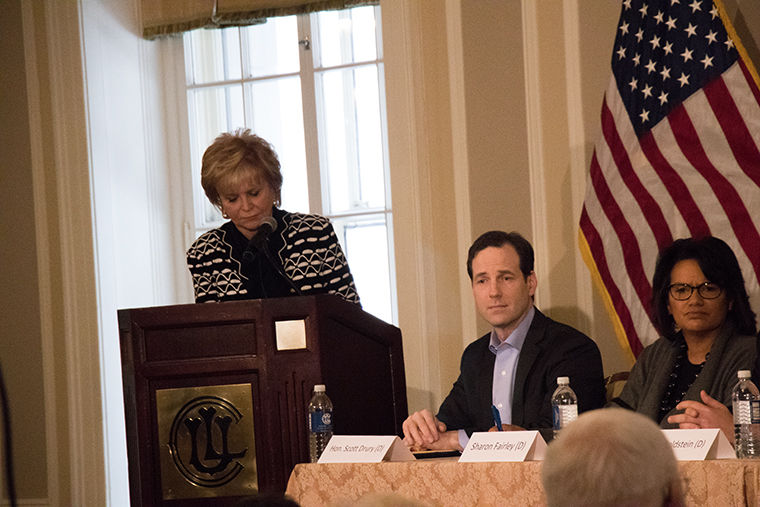Attorney general candidates address conflicts of interest, sexual harassment, gun violence
March 12, 2018
After Lisa Madigan announced she would not seek re-election in 2017, a plethora of candidates have entered the March 20 primary to succeed her.
All 10 candidates met at a March 7 forum at the Union League Club of Chicago, 65 Jackson Blvd., where they discussed gun control, conflicts of interest in campaign funding and methods to address sexual harassment in the capitol. The panel included Democrats Scott Drury, Sharon Fairley, Aaron Goldstein, Renato Mariotti, Pat Quinn, Kwame Raoul, Nancy Rotering and Jesse Ruiz, and Republicans Gary Grasso and Erika Harold.
Organized by the Illinois Campaign for Political Reform, the debate was moderated by NBC Chicago’s Carol Marin.
While almost all candidates agreed on the need for stricter regulations to prohibit elected officials’ conflicts of interests, Raoul, a state senator from Chicago, said nearly every profession will be subject to the law and certain conflicts of interests cannot be avoided. Other candidates disagreed.
“It is vitally important to our democracy to know that the people are representing us and not their own personal interests, not personally getting rich [to] the detriment of the public that they have been elected to serve,” said Rotering, who is the current mayor of Highland Park, Illinois.
Mariotti, a Chicago attorney, said the voters must be aware of the special interest donations funneling into the current attorney general race.
“It’s up to all of you to do your homework because those 30-second ads don’t say ‘paid for by property tax appeal lawyers,’ or ‘by a ComEd conglomerate,’” Mariotti said.
Marin confronted Raoul about his campaign funding from “Big Tobacco” industries, for which he has been attacked in opponent’s TV ads. Raoul replied he is “not for sale,” has never voted in favor of the tobacco industry and consistently supports the American Lung Association.
While some candidates have largely self-funded their campaigns, Fairley argued that candidates are disadvantaged by current laws.
“I didn’t create the laws on campaign finance, which are pretty terrible in my view,” she said. “I am not the one who broke the [campaign funding] caps in this case, that created the situation where we had hundreds of thousands of dollars flowing to a lot of candidates from sources [where] there are conflicts of interest.”
Rotering, Ruiz and Harold have all received campaign money from utility companies such as People’s Gas, Exelon Corporation and ComED, Marin indicated.
“If I thought a contribution created a conflict of interest, I would not accept the contribution,” said Harold, a practicing attorney. “If there was a case that was pending before the attorney general’s office, then I would not accept [those] contributions.”
When the Me Too movement headed to Springfield, state legislators, lobbyists and staff spoke up about the capitol’s culture of sexual harassment. At the time, there was no legislative inspector general to investigate complaints. Marin asked the candidates how as attorney general they plan to combat sexual harassment in state government more effectively.
Rotering had three specific initiatives: amend the Human Rights Act to include all employers; establish a confidential hotline for people to report misconduct directly to the attorney general’s office, protecting them from retaliation; and change the current laws so “serial sexual harassers are viewed as the criminals that they are.”
Alicia Dale, owner of a South Loop consulting firm, attended the debate and said Rotering’s answer was the most direct and relevant of all the candidates’ responses.
Mariotti suggested extending the statute of limitations so women can hold perpetrators accountable, even if incidents happened years ago. The current statute of limitations for sexual assault is to report the offense within three years of its occurrence and file charges within 10 years.
“The reality is that you can’t trust the General Assembly to police itself,” Mariotti said.
Harold said she has been a victim of sexual harassment and knows that many people are afraid to come forward with allegations.
“The attorney general needs more oversight over [the] inspector general ,” she said. “People fear coming forward [that] they won’t be believed or will be retaliated against.”
During questions on gun control, Grasso characterized gun violence and mass shootings as a mental health epidemic.
Rotering said the Illinois attorney general should work with other state attorneys general to create change at the federal level, adding that gun data should be studied by the Center for Disease Control as a public health issue.
Drury suggested using conspiracy laws to hold gun manufacturers accountable for the loss of lives.
Reflecting on the event’s evaluation form that asked if attendees are students, nonprofit workers, professionals, elected officials, government employees or advocates, Dale said she realized first and foremost she is a citizen.
“Every citizen needs to be informed,” she said. “I would like events like this reach more of the everyday people.”








